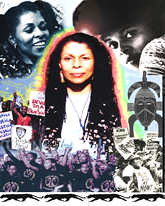
Assata Shakur (former Black Panther, accused and convicted of murder, who escaped from prison and is an exile in Cuba) is back in the news these days. The US State department recently increased the reward for her capture up to $1 million. As a Black Cuban-American who tries to think of himself as progressive it is somewhat tricky to tease apart and correctly delineate my thoughts and feelings on the subject. It's not that I think Assata should be returned. There is no question that the FBI had a policy of framing the Panthers (several have had convictions overturned after years in prison) and there is a strong argument for her innocence.
But at the same time, I wish so many activists wouldn't just simplistically and uncritically ride Castro's jock. Yes the revolution did away with some of the more egregious forms of institutional racism in Cuba and should be given credit for that. But what have you done for me lately?
A really good book which gives a counter-balancing view of race in Cuba, is Carlos Moore's Castro, the Blacks and Africa. Carlos Moore is of West Indian parentage, born and raised in Cuba, and who was later considered "lieutenant" to Afrocentric scholar Cheikh Anta Diop (who comes from a Senegalese Muslim family). The book goes into a lot of detail on the persistent and varied forms of racism in Cuba, even after the revolution. And it goes on to point out how certain expression of difference by Afro-Cubans were seen as dissent and suppressed by the state.
In a lot of ways, the Cuban regime's support for Assata Shakur is very hypocritical because Castro would never tolerate a Black Panther-like party in Cuba. (If one arose, all its members would be swiftly thrown in jail along with the political prisoners Cuba already has). It's pretty clear that Assata and other such figures in the past are being used as pawns by Castro in order to embarrass the US. True commitment to liberation means opposing oppression everywhere whether it is carried out by the US government or Cuban one.
If you don't have time to read Moore's thorough account, some articles available online in similar spirit can be found below:
Cuba Begins to Answer Its Race Question
A brief piece about Carlos Moore which appeared in Essence magazine in 1989
National Identity On Trial: The Case of Post-Revolutionary Cuba a paper by Peter Kwaku Maybarduk
An excerpt from the book, A Nation for All: Race, Inequality, and Politics in Twentieth-Century Cuba
And finally, a more personal piece by Dr. Miguel A. De La Torre about pre-revolutionary race relations in Cuba and his own experiences as a Latino in the US called MASKING HISPANIC RACISM: A CUBAN CASE STUDY
No comments:
Post a Comment